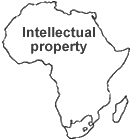

 |
 |
|
|
South African TrademarksAn Information Pamphlet Registration
Although registration of a trade mark is not compulsory,
it is advisable to apply for registration, because registration provides
a cost-effective way to preventing infringement, and also prevents
others from appropriating and registering your trade mark. In addition, registration is a guarantee of
immunity to infringement actions based on the registered trade marks
of other parties. A trade mark may be used prior to the application for
registration thereof. Such
use can sometimes strengthen the position of a trade mark. If such
use is sufficiently extensive that a reputation is generated, and
members of the public come to associate the mark with the person/entity
making use thereof, common law rights may be acquired in the mark.
These rights exist independently of statutory trade mark rights, which
are acquired through registration. It is, however, safer to apply for registration before
using the mark for the following reasons:
firstly, the application may be rejected because it is unsuitable
for registration. In such
cases it is still possible to amend the mark or choose an altogether
new mark before money is spent on advertising, stationery, etc.
Secondly, the only effective means of preventing unauthorised
use by other parties during the early stages of use of the mark is
a valid registration. There are many pitfalls in Trade Mark Law and Practice
that should be avoided when choosing a mark for registration. Our advice in such matters is at your disposal.
Conflicting
registered marks
Clients are strongly advised to instruct us to conduct
a search for conflicting marks on the register before using
or applying to register a mark. This
may save you considerable inconvenience and expense later on. We also
recommend that we conduct searches of the corporate name and domain
name registers to ensure that there are no conflicting entries on
these registers. Selection The modern predilection to select trade marks which
are semi-descriptive, in that they hint at the nature or quality of
the goods, has the legal disadvantage that they may not qualify for
registration. By contrast an invented word or novel mark can qualify
for registration immediately. Oppositions against trade mark applications The law provides for various grounds upon which persons
with an interest in an intended registration may lodge an opposition.
We provide clients with advice and assist them in opposition
matters. It is our policy
to settle disputes out of court if it is possible to achieve satisfactory
results in this manner. Types of trade mark registrations
and uses In general, trade marks can be registered for any goods
which are or will be sold under the trade mark and also for any services
rendered under a trade mark. If the mark is not used in South Africa in respect
of the goods and/or services for which it is registered for a continuous
period of 5 years after the date of issue of the registration certificate,
the mark may become vulnerable to expungement. Failure to use a trade
mark in relation to all goods or services for which it is registered
may render the trade mark registration vulnerable to partial cancellation. The Trade Marks Act makes provision for the registration of authorised users of trade marks on the trade marks register. We strongly recommend that usership agreements are registered as this may be of assistance in claims for damages against infringers. |
|